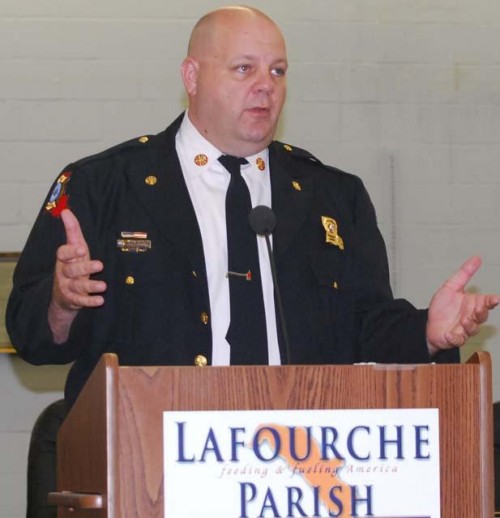
TGMC dedicates pictured wall of donors
April 19, 2011
Lafourche permit office tries to stymie
April 21, 2011“Would you want to eat this?” asked commercial fisherman Donald “Donny” Waters of Venice as he and his business partner, Wayne Werner of Leeville, circulated among the more than 125 observers at the Houma-Terrebonne Civic Center on Monday and showed photographs of ulcerated fish they have been catching off the Louisiana and Mississippi coasts following the April 20, 2010 explosion and oil spill from the BP Deepwater Horizon.
“I want answers,” said a tearful Dena Bernard of Cut Off, who wondered why after her husband, Murphy, lost his shallow water drilling work following the BP disaster they are constantly rejected assistance from the Gulf Coast Claims Facility. “We have been living on eggs, beans and rice for the past year,” she said. “It’s hard when you can’t afford your medication too. And if there is a hurricane we cannot afford to evacuate.”
Fishermen, oil industry workers, environmentalists and members of the public gathered to hear a panel of seven government and business professionals tell members of the U.S. House of Representatives Natural Resource Committee their experiences and concerns just two days before the first anniversary of the worst oil spill to ever occur in North America.
In an exclusive interview before the hearing, committee chairman Doc Hastings of Pasco, Wash., told the Tri-Parish Times that the Natural Resource Committee has passed a bill set to go before the full House of Representatives in May that is aimed at restoring jobs in the Gulf of Mexico. “The essence of that bill is that of all the [drilling] permits that were suspended the [Department of Interior] has to act on those permits in a timely manner so there is some certainty for those permits. We believe if they are acted on then we can get more normalcy in the whole process,” he said.
Hastings said that permit delays appear to be political more than environmental or industrial in nature. “I am concerned that this [Obama] administration is slow walking the permits,” he said. “I can’t tell you the motivation, but I think it is pretty clear that they are slow walking it. What we are trying to do is aim specifically at the Gulf and get the Gulf working again.”
“The reason we are here is to hear the impacts first hand now that we are nearing a year since the BP spill” Hastings said. “We are here to hear from the people what has happened and where we need to go from here.”
The panel of witnesses included Jerome Zeringue with the governor’s office on coastal affairs, Motivatit Seafoods owner and CEO Mike Voisin, RigChem President Lori Davis, Mariah Jade Shrimp Co. owner Kim Chauvin, Gulf Coast Economic Survival Team Executive Director Lori LeBlanc, Cajun Fishing Adventures President Ryan Lambert and United Houma Nation Principal Chief (ex officio) Brenda Dardar Robichaux.
Voisin, a seventh generation oyster farmer and processor, told the committee that public perception is the biggest problem for the seafood industry at this time. “It is imperative that consumers regain confidence in the safety and quality of Gulf coast seafood,” he said.
While some fishermen like Waters voice concern about what they are catching, Voisin testified that according to the National Oceanographic and Atmospheric Administration as well as the Environmental Protection Agency, 99 percent of more than 300,000 gulf seafood samples were found to be completely safe and ready for human consumption.
“I fear [current communications regarding seafood safety] may not be enough,” Voisin said. “Going forward, there may be a significant opportunity to address the long term marketing needs of the Gulf Coast seafood community in the form of federal legislation being drafted to direct Clean Water Act penalties back to the Gulf Coast for environmental and economic rehabilitation.”
“Today, as president and co-owner of RigChem, I have been faced with a battle that we were never prepared to fight,” Davis told the committee. “Since the [deepwater drilling] moratorium on our industry and the slow recovery, things have been extremely different.”
Davis told how the company her parents built and she and her siblings operate was born out of the $25,000 severance package her father received after losing his oil industry job in 1984. Working to build a successful offshore support business is challenging enough, she stressed, without being concerned about their “uncertain” future.
“For the first time ever, we’ve had to activate lines of credit to keep afloat for the basic expenses,” Davis testified. “If we had not had liquidity in our company and the stability of personal finances we would have been out of business. … As a company we have been forced to look for other [work] opportunities, some outside this state others outside this country.”
Davis noted that while an event such as a hurricane can have an end in sight, life after the BP spill has been an event that “we were never prepared to weather or financially support.”
Chauvin put aside her prepared statement and told the committee she was speaking from the heart.
At times fighting back tears, Chauvin told how she and her husband built their business and how its existence has been threatened during the past 12 months not only because of the oil spill, but also because of a lack of transparency and cooperation from the GCCF. How that agency lost her paperwork for restitution 10 times and how the GCCF lost a laptop computer with all her employee and business information. “No one loses that much paperwork. This is ridiculous,” she said.
“I cannot call in to find out what is going on with my claim. Because the person you speak to doesn’t know either,” Chauvin said. “You have to get a lawyer and that is the only way you are going to get an answer.
“It is not like a hurricane. We cannot evacuate from an oil spill,” Chauvin said. Like Davis, Chauvin said that her company, which had operated smoothly in the black, is now forced to borrow money to maintain operations.
“This is more than anything I could ever imagine,” Chauvin said. “We welcome [seafood testing], but the fishermen end up paying because of regulations. Twenty-five years we’ve been in this business and Feinberg says my company is only worth $25,000? I think we need accountability and transparency.”
LeBlanc shared comments from various Gulf businesses and noted that Louisiana ranks first in offshore crude oil and natural gas production as well as revenue generated for the government.
“It is absolutely amazing that the United States of America shut down the [offshore] oil and gas industry for 314 days … as the result of a single incident,” LeBlanc said. “We’re not talking about the quilt making industry. We’re talking about America’s energy industry,” she said.
Lambert stressed the significance of the Louisiana coast and marshlands to commercial and charter business. “The fate of our fisheries is highly uncertain,” he said. “Many fishermen and their families are struggling to get by after a year with no income.”
Lambert, along with Robichaux, stressed that not only business, but also a way of life have been severely impacted for people along the Louisiana coast because of the BP spill and delays in cleanup and compensation.
“Tribal citizens have been living, hunting, fishing, shrimping, crabbing, trapping and harvesting oysters in the coastal marshes and wetlands of our communities for centuries,” Robichaux said. “Our people follow the season … the lifestyle of our people is now in jeopardy.”
“I’m very, very pleased that Chairman Hastings and the Natural Resources Committee was here to hear from folks affected by the oil spill,” said Rep. Charles Boustany (R-Lafayette). “The one thing that is clear to me and anyone who represents coastal Louisiana, we more than anybody understand how good energy policy, economic policy and environmental policy can go hand in hand. So many work in oil and gas, but at the same time we care about our wetlands and our way of life down here.”
Boustany said that the Obama Administration needs to make sure that fines assessed against BP are allocated to the Gulf Coast, and moving the country forward with a realistic energy plan. “That includes restoring oil production in the Gulf of Mexico. That’s part of what we do.” he said.
“I think the biggest holdup is the process that Feinberg and them are using. It is not as efficient as maybe they though it was. I think maybe they need to go back and revisit that particular process,” Rep. Jeff Landry (R-New Iberia) said. “The buck stops with the [Obama] administration. That is the administration’s guy. So whether it is from a claims standpoint or a permitting standpoint from the oil and gas industry, it seems like everything goes back to this administration.”
“The response has been good,” Hastings said of public interaction. “[We hope to get] more normalcy in the process.”












